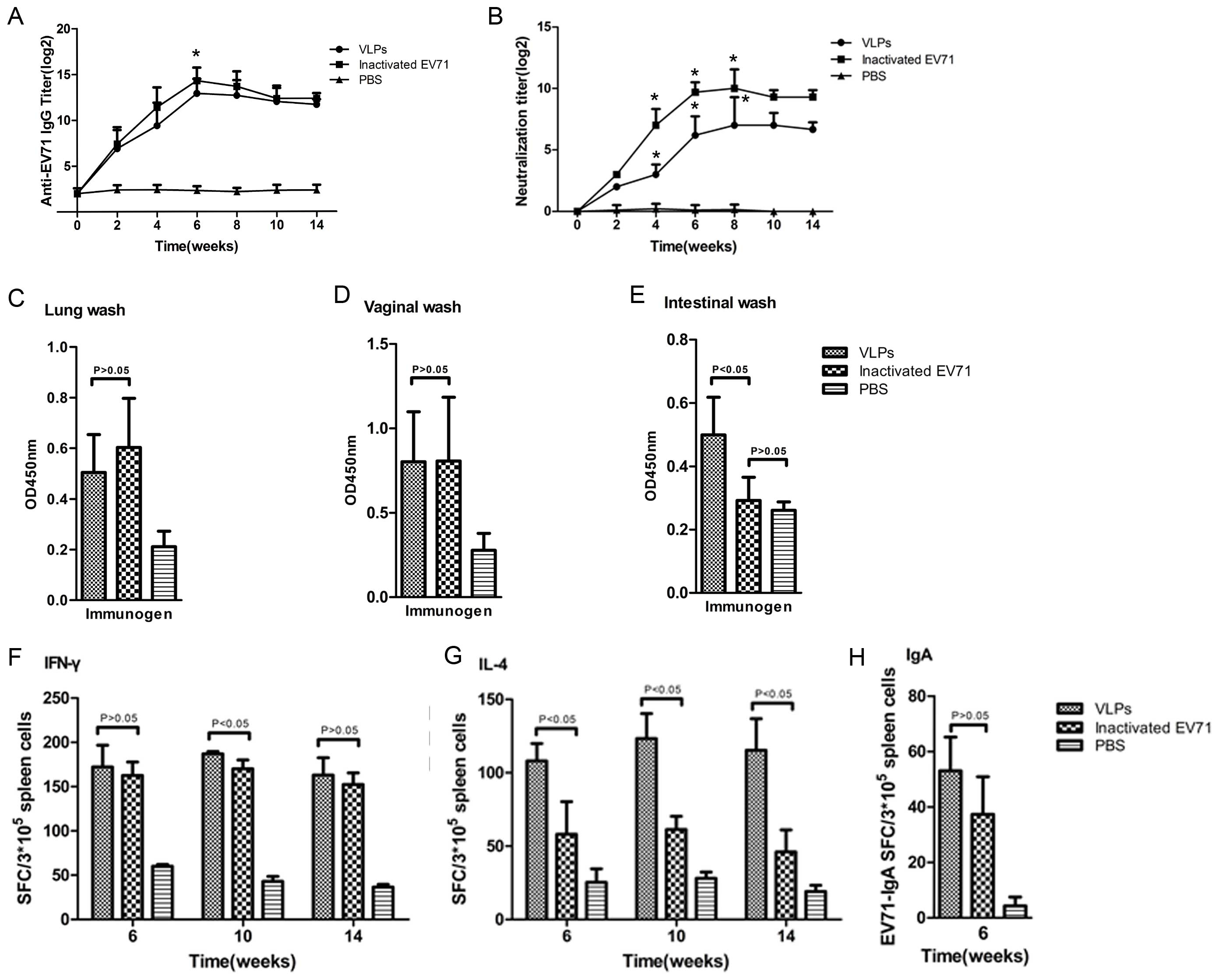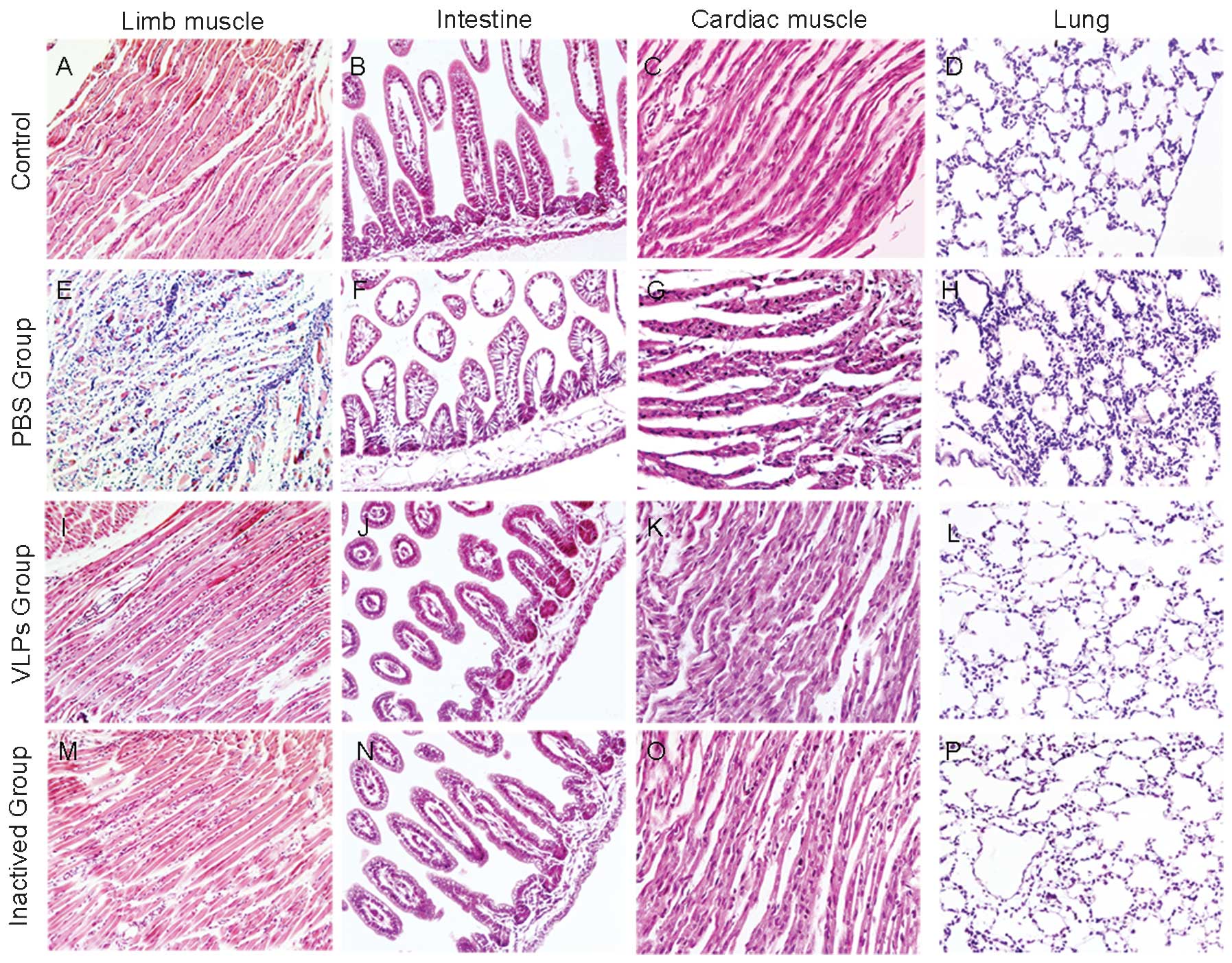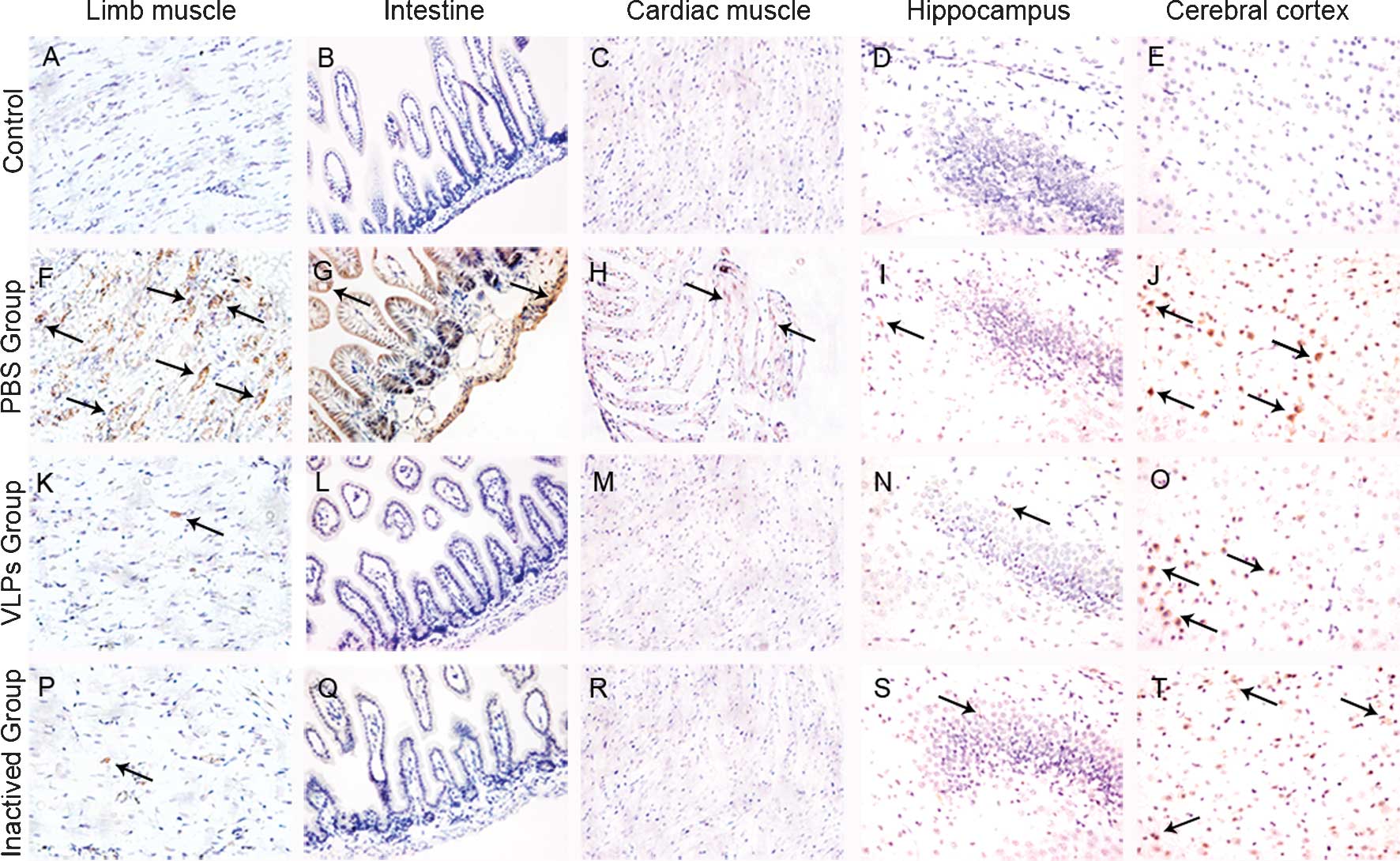|
1
|
Chan KP, Goh KT, Chong CY, Teo ES, Lau G
and Ling AE: Epidemic hand, foot and mouth disease caused by human
enterovirus 71, Singapore. Emerg Infect Dis. 9:78–85. 2003.
View Article : Google Scholar : PubMed/NCBI
|
|
2
|
McMinn PC: An overview of the evolution of
enterovirus 71 and its clinical and public health significance.
FEMS Microbiol Rev. 26:91–107. 2002. View Article : Google Scholar : PubMed/NCBI
|
|
3
|
Brown BA and Pallansch MA: Complete
nucleotide sequence of enterovirus 71 is distinct from poliovirus.
Virus Res. 39:195–205. 1995. View Article : Google Scholar : PubMed/NCBI
|
|
4
|
Liu CC, Chou AH, Lien SP, Lin HY, Liu SJ,
Chang JY, Guo MS, Chow YH, Yang WS, Chang KH, et al: Identification
and characterization of a cross-neutralization epitope of
enterovirus 71. Vaccine. 29:4362–4372. 2011. View Article : Google Scholar : PubMed/NCBI
|
|
5
|
Qiu J: Enterovirus 71 infection: A new
threat to global public health? Lancet Neurol. 7:868–869. 2008.
View Article : Google Scholar : PubMed/NCBI
|
|
6
|
Wang SM, Lei HY, Huang KJ, Wu JM, Wang JR,
Yu CK, Su IJ and Liu CC: Pathogenesis of enterovirus 71 brainstem
encephalitis in pediatric patients: Roles of cytokines and cellular
immune activation in patients with pulmonary edema. J Infect Dis.
188:564–570. 2003. View
Article : Google Scholar : PubMed/NCBI
|
|
7
|
Cardosa MJ, Perera D, Brown BA, Cheon D,
Chan HM, Chan KP, Cho H and McMinn P: Molecular epidemiology of
human enterovirus 71 strains and recent outbreaks in the
Asia-Pacific region: Comparative analysis of the VP1 and VP4 genes.
Emerg Infect Dis. 9:461–468. 2003. View Article : Google Scholar : PubMed/NCBI
|
|
8
|
Fujimoto T, Chikahira M, Yoshida S, Ebira
H, Hasegawa A, Totsuka A and Nishio O: Outbreak of central nervous
system disease associated with hand, foot, and mouth disease in
Japan during the summer of 2000: Detection and molecular
epidemiology of enterovirus 71. Microbiol Immunol. 46:621–627.
2002. View Article : Google Scholar : PubMed/NCBI
|
|
9
|
Yi L, Lu J, Kung HF and He ML: The
virology and developments toward control of human enterovirus 71.
Crit Rev Microbiol. 37:313–327. 2011. View Article : Google Scholar : PubMed/NCBI
|
|
10
|
Chong P, Hsieh SY, Liu CC, Chou AH, Chang
JY, Wu SC, Liu SJ, Chow YH, Su IJ and Klein M: Production of EV71
vaccine candidates. Hum Vaccin Immunother. 8:1775–1783. 2012.
View Article : Google Scholar : PubMed/NCBI
|
|
11
|
Lin YL, Yu CI, Hu YC, Tsai TJ, Kuo YC, Chi
WK, Lin AN and Chiang BL: Enterovirus type 71 neutralizing
antibodies in the serum of macaque monkeys immunized with EV71
virus-like particles. Vaccine. 30:1305–1312. 2012. View Article : Google Scholar : PubMed/NCBI
|
|
12
|
Noad R and Roy P: Virus-like particles as
immunogens. Trends Microbiol. 11:438–444. 2003. View Article : Google Scholar : PubMed/NCBI
|
|
13
|
Chang LY, Hsiung CA, Lu CY, Lin TY, Huang
FY, Lai YH, Chiang YP, Chiang BL, Lee CY and Huang LM: Status of
cellular rather than humoral immunity is correlated with clinical
outcome of enterovirus 71. Pediatr Res. 60:466–471. 2006.
View Article : Google Scholar : PubMed/NCBI
|
|
14
|
Ku Z, Ye X, Huang X, Cai Y, Liu Q, Li Y,
Su Z and Huang Z: Neutralizing antibodies induced by recombinant
virus-like particles of enterovirus 71 genotype C4 inhibit
infection at pre- and post-attachment steps. PLoS One.
8:e576012013. View Article : Google Scholar : PubMed/NCBI
|
|
15
|
Chang LY, Chang IS, Chen WJ, Huang YC,
Chen GW, Shih SR, Juang JL, Shih HM, Hsiung CA, Lin TY, et al:
HLA-A33 is associated with susceptibility to enterovirus 71
infection. Pediatrics. 122:1271–1276. 2008. View Article : Google Scholar : PubMed/NCBI
|
|
16
|
Khong WX, Foo DG, Trasti SL, Tan EL and
Alonso S: Sustained high levels of interleukin-6 contribute to the
pathogenesis of enterovirus 71 in a neonate mouse model. J Virol.
85:3067–3076. 2011. View Article : Google Scholar : PubMed/NCBI
|
|
17
|
Zhang Y, Cui W, Liu L, Wang J, Zhao H,
Liao Y, Na R, Dong C, Wang L, Xie Z, et al: Pathogenesis study of
enterovirus 71 infection in rhesus monkeys. Lab Invest.
91:1337–1350. 2011. View Article : Google Scholar : PubMed/NCBI
|
|
18
|
Ong KC and Devi S:
Formaldehyde-inactivated whole-virus vaccine protects a murine
model of enterovirus 71 encephalomyelitis against disease. J Virol.
84:661–665. 2010. View Article : Google Scholar :
|
|
19
|
Hsiung GD: Virus assay, neutralization
test and antiviral assay. Hsiung’s Diagnostic Virology. 4th ed.
Hsiung GD, Fong CKY and Landry ML: Yale University Press; New
Haven: pp. 46–55. 1994
|
|
20
|
Cao L, Yi Y, Song JD, Tian MM, Tian RG,
Meng QL, Qiu F, Jia ZY and Bi SL: The assemblage, purification and
characterization of EV71 VLPs expressed in baculovirus. Bing Du Xue
Bao. 28:201–206. 2012.In Chinese. PubMed/NCBI
|
|
21
|
Jia CS, Liu JN, Li WB, Ma CM, Lin SZ, et
al: The cross-reactivity of the enterovirus 71 to human brain
tissue and identification of the cross-reactivity related
fragments. Virol J. 7:472010. View Article : Google Scholar : PubMed/NCBI
|
|
22
|
Meng T, Kolpe AB, Kiener TK, Chow VT and
Kwang J: Display of VP1 on the surface of baculovirus and its
immunogenicity against heterologous human enterovirus 71 strains in
mice. PLoS One. 6:e217572011. View Article : Google Scholar : PubMed/NCBI
|
|
23
|
Foo DG, Alonso S, Chow VT and Poh CL:
Passive protection against lethal enterovirus 71 infection in
newborn mice by neutralizing antibodies elicited by a synthetic
peptide. Microbes Infect. 9:1299–1306. 2007. View Article : Google Scholar : PubMed/NCBI
|
|
24
|
Wang X, Peng W, Ren J, Hu Z, Xu J, Lou Z,
Li X, Yin W, Shen X, Porta C, et al: A sensor-adaptor mechanism for
enterovirus uncoating from structures of EV71. Nat Struct Mol Biol.
19:424–429. 2012. View Article : Google Scholar : PubMed/NCBI
|
|
25
|
Wen ZS, Xu YL, Zou XT and Xu ZR: Chitosan
nanoparticles act as an adjuvant to promote both Th1 and Th2 immune
responses induced by ovalbumin in mice. Mar Drugs. 9:1038–1055.
2011. View Article : Google Scholar : PubMed/NCBI
|
|
26
|
Emeny RT, Wheeler CM, Jansen KU, Hunt WC,
Fu TM, Smith JF, MacMullen S, Esser MT and Paliard X: Priming of
human papillomavirus type 11-specific humoral and cellular immune
responses in college-aged women with a virus-like particle vaccine.
J Virol. 76:7832–7842. 2002. View Article : Google Scholar : PubMed/NCBI
|
|
27
|
Quan FS, Huang C, Compans RW and Kang SM:
Virus-like particle vaccine induces protective immunity against
homologous and heterologous strains of influenza virus. J Virol.
81:3514–3524. 2007. View Article : Google Scholar : PubMed/NCBI
|
|
28
|
Liu L, Zhao H, Zhang Y, Wang J, Che Y,
Dong C, Zhang X, Na R, Shi H, Jiang L, et al: Neonatal rhesus
monkey is a potential animal model for studying pathogenesis of
EV71 infection. Virology. 412:91–100. 2011. View Article : Google Scholar : PubMed/NCBI
|
|
29
|
Wang W, Duo J, Liu J, Ma C, Zhang L, Wei Q
and Qin C: A mouse muscle-adapted enterovirus 71 strain with
increased virulence in mice. Microbes Infect. 13:862–870. 2011.
View Article : Google Scholar : PubMed/NCBI
|
|
30
|
Duo J, Wang W, Tong W, Cong Z, Jiang H, Xu
W, et al: Experimental Studies on ICR Mice with EV71 Infection.
Chin J Comp Med. 19:41–46. 2009.
|
|
31
|
Xiu JH, Zhu H, Xu YF, Liu JN, Xia XZ and
Zhang LF: Necrotizing myositis causes restrictive hypoventilation
in a mouse model for human enterovirus 71 infection. Virol J.
10:2152013. View Article : Google Scholar : PubMed/NCBI
|



















